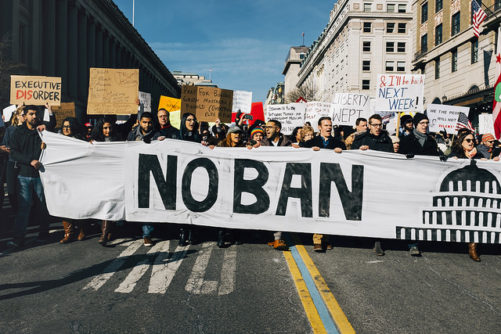
February 9, 2017; Politico and Bloomberg
Courts have a duty “in time of war as well as in time of peace, to preserve unimpaired the constitutional safeguards of civil liberty.” That is why we always need to include litigation in our strategies to achieve social justice.
Late yesterday afternoon, a three-judge panel of the 9th Circuit Court of Appeals unanimously ruled that President Trump’s travel ban should not be immediately reinstated while a court challenge is being heard.
The ruling acknowledged competing interests: “On the one hand, the public has a powerful interest in national security and in the ability of an elected president to enact policies. And on the other, the public also has an interest in free flow of travel, in avoiding separation of families, and in freedom from discrimination.”
But in the end, “The Government has not shown that the Executive Order provides what due process requires, such as notice and a hearing prior to restricting an individual’s ability to travel.” Ruled the court, “Indeed, the Government does not contend that the Executive Order provides for such process.”
It also took the administration to task for its now too-familiar disdainful attitude toward the judiciary as evidenced in the case. “Rather than present evidence to explain the need for the executive order,” reads one section of the ruling, “the government has taken the position that we must not review the decision at all.” Naturally, the court disagrees. “There is no precedent to support this claimed unreviewability, which runs contrary to the fundamental structure of our democracy.”
The court found further that the states of Washington and Minnesota, which together instituted the original suit, had a supportable case in that the federal government “has not demonstrated that the States lack viable claims based on the due process rights of persons who will suffer injuries to protected interests due to the Executive Order.”
The next step for the government may be to take the issue of the stay to the U.S. Supreme Court. In the meantime, the executive order remains suspended while the underlying case that sparked the request for the immediate stay remains to be litigated in federal district court. Alternatively, the Justice Department could choose to ask the Ninth Circuit to hear the case “en banc,” with ten judges (including the three that issued yesterday’s ruling) reviewing the case for the immediate stay of the federal district court’s order.
The three judges on the panel took collective responsibility for the ruling: Carter appointee William Canby Jr., George W. Bush appointee Richard Clifton and Obama appointee Jennifer Freidland. This perhaps prevented the usual personalization of beefs on Twitter as Trump quickly responded, “SEE YOU IN COURT, THE SECURITY OF OUR NATION IS AT STAKE!”
Sign up for our free newsletters
Subscribe to NPQ's newsletters to have our top stories delivered directly to your inbox.
By signing up, you agree to our privacy policy and terms of use, and to receive messages from NPQ and our partners.
SEE YOU IN COURT, THE SECURITY OF OUR NATION IS AT STAKE!
— Donald J. Trump (@realDonaldTrump) February 9, 2017
The president repeatedly warned the judges on the panel that they would be blamed if the U.S. suffered a terrorist attack from migrants while the order remained lifted. He not only called the Ninth Circuit arguments on the issue “disgraceful” but suggested political bias was at the base of any judicial resistance to his order.
The Ninth Circuit ruling largely avoided the most explosive issue in the case—whether Trump’s order was unconstitutionally tainted by anti-Muslim bias. The decision says it is “well established” that when considering the legality of government actions, courts can consider public comments such as Trump’s public call for a ban on immigration by Muslims. However, the ruling says that the appeals judges decided to reserve judgment on that issue, in part because of “the sensitive interests involved.”
White House press secretary Sean Spicer tried to spin the loss by asserting that the court only considered a “narrow” procedural issue (whether to issue an immediate stay of the district court’s decision to suspend enforcement of the executive order) and that the fight was not done.
Indeed, 20 other legal challenges to the order are now pending across the country, and the ACLU, which has been involved in a number of these suits, vows to continue fighting the “Muslim ban” every step of the way.
“The government’s erratic and chaotic attempts to enforce this unconstitutional ban have taken a tremendous toll on innocent individuals, our country’s values, and our standing in the world,” says Omar Jadwat, director of the ACLU’s Immigrants’ Rights Project.—Ruth McCambridge












